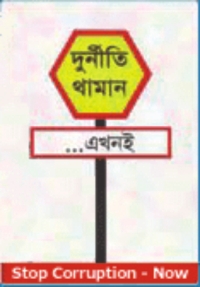|
Musings
Tackling Corruption the Old Fashioned Way
Shabnam Huq
Gone are the days when civil society rolled their eyes and turned up their noses at the mention of the “dishonest” man. In today's society, dishonesty and hence honesty is relative. There are degrees of honesty unique to our Banglish vocabulary, somewhat honest, very honest, relatively honest and even, honest due to lack of opportunity. These are home grown classifications we take refuge in to distance ourselves from those who are truly “corrupt”. Today corrupt individuals are no longer shunned by society, nor are they judged on their questionable means of accumulating wealth; they are glorified, emulated and more often than not envied.
 When Bangladesh topped the charts for the fifth consecutive time on TI's most corrupt nations list, the people of Bangladesh sighed. A sigh not of disbelief but of acquiescence. Politicians criticised the methodology, questioned the intent and screamed bias and finally, to restore our tarnished global image, established the highly controversial Anti Corruption Commission. The nonchalance of our policy makers and influencers grows as our economic indicators portray progress. After all, if GDP growth rate is at a healthy 6.5%, remittances are almost USD 4 bn and forex reserves above USD 3.4 bn, what is a little corruption? Besides, corruption is not unique to Bangladesh or developing nations. The Enron debacle, the Halliburton and Bechtel bonanza in Iraq and more recently the exploits of Jack Abramoff the US lobbyist are examples that corruption exists in most countries in some form or other. As countries move along the development disposition funnel, corruption takes on a concentrated form, involving only those at the top and concerning sums of money that we cannot imagine. However, the risk of exposure is high coupled with the certainty of swift and thorough legal consequences. When Bangladesh topped the charts for the fifth consecutive time on TI's most corrupt nations list, the people of Bangladesh sighed. A sigh not of disbelief but of acquiescence. Politicians criticised the methodology, questioned the intent and screamed bias and finally, to restore our tarnished global image, established the highly controversial Anti Corruption Commission. The nonchalance of our policy makers and influencers grows as our economic indicators portray progress. After all, if GDP growth rate is at a healthy 6.5%, remittances are almost USD 4 bn and forex reserves above USD 3.4 bn, what is a little corruption? Besides, corruption is not unique to Bangladesh or developing nations. The Enron debacle, the Halliburton and Bechtel bonanza in Iraq and more recently the exploits of Jack Abramoff the US lobbyist are examples that corruption exists in most countries in some form or other. As countries move along the development disposition funnel, corruption takes on a concentrated form, involving only those at the top and concerning sums of money that we cannot imagine. However, the risk of exposure is high coupled with the certainty of swift and thorough legal consequences.
In Bangladesh, corruption is not concentrated neither is the legal system efficient enough to curb it. Pervasive corruption touches the lives of every Bangladeshi and petty corruption, if we can term it that, falls disproportionately on the poor. From the traffic sergeant to the Member of Parliament, from the political crony to the tycoon, a clean paw is a rarity indeed. We may believe that reform should come from the top, but it will not. We may want checks and balances in the government machinery to exist, but it cannot. The upside of the status quo is too great for those who can make a difference and those who are most affected do not have the power to make any change.
As corruption seeps deeper into our social fabric, morality is being replaced by greed, envy and dishonesty. Today, age-old adages ring true “the end justifies the means” and “nothing succeeds like success” because success is now measured by the shortest possible route to the greatest possible wealth. The consequences of today's corruption and the decay of our society will undoubtedly fall on our next generation. This is a concern that can only be appreciated by society's moral compass keepers, civil society.
“Naming and shaming”, aptly coined by the Ambassador Butenis, worked to discourage corruption in our society even as early as a generation ago. It is time again for civil society to raise a united voice to identify and shame those who corrupt not just themselves but all the generations to come. It is time for civil society to restore honesty, pride and virtue into the lives of our people again.
Copyright
(R) thedailystar.net 2006 |
